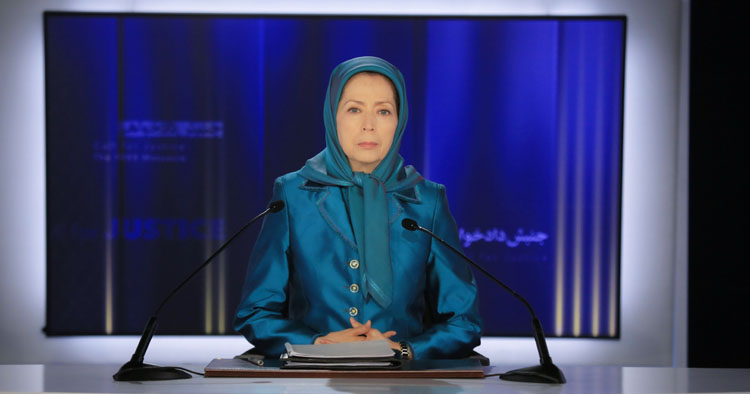In a conference coinciding with the 30th anniversary of the 1988 massacre, on August 27th, more than 1,000 political prisoners and witnesses of torture in prisons and dungeons of the clerical regime demanded an end to the impunity enjoyed by the regime leaders and to prosecute Khamenei, Raisi, Judiciary Chief, Eje’i and other perpetrators of the massacre.
Speech of the keynote speaker Maryam Rajavi, president-elect of the National Council of Resistance of Iran (NCRI):
Greetings to you and the distinguished political dignitaries, jurists, parliamentarians, and human rights advocates attending this conference!
Thirty-three years ago, in the summer of 1988, Khomeini issued a fatwa (a religious decree) to execute all imprisoned members of the People’s Mojahedin Organization of Iran (PMOI/MEK), who remained steadfast. Some 30,000 political prisoners, 90% of whom were PMOI members, were subsequently executed. The mass killing quickly spread to other prisoners.
August 27 is a reminder of the day 33 years ago when, according to numerous documents and reports, the executions of Marxist and Kurdish combatants, including members of the Kurdistan Democratic Party of Iran, Komeleh, and the Khabat Organization of Iranian Kurdistan, began. We pay tribute to everyone who laid down their lives for Iran’s freedom, many of them still unknown.
Nevertheless, today, we see an extraordinary gathering with no precedent in the history of people’s struggles for human rights and the call for justice for the blood unjustly shed.
Some 1,000 political prisoners tortured under the dictatorships of the mullahs and Shah are attending today’s gathering from Ashraf-3; approximately a quarter of them are women.
We also have many former political prisoners joining us from various countries.
Many of them were first-hand witnesses to the countless executions in the 1980s and the massacre of political prisoners in 1988. They are the survivors of a bloody and widespread crackdown with 120,000 victims.
The clerical regime wanted to break and defeat every member and supporter of the PMOI/MEK by torturing, burning, and flogging. It tried all evil, malicious, and inhuman tactics.
They inflicted the most depraved tortures on the female PMOI/MEK prisoners in the so-called “residential units.” They locked them in “cages” for weeks and months to break their spirit of resistance.
Finally, in the summer of 1988, PMOI members were offered a choice between death or submission coupled with renouncing their loyalty to the PMOI/MEK.
However, the generation that stepped into this path inspired by Massoud Rajavi and longing for freedom resisted heroically in prisons, under torture, and in the harshest conditions. Even when they had to choose between surrender and execution, they courageously adhered to their principles: the overthrow of the clerical regime and the establishment of freedom for the people.
The courageous PMOI/MEK prisoners and other brave activists proved that their resistance, even with hands tied and in dark and damp cells, was part of the campaign to overthrow the regime. In this struggle, the executioner bowed to the prisoners’ resolve and determination.
Some of those former political prisoners later laid down their lives in the operations of the National Liberation Army of Iran or during the clerical regime’s missile and rocket attacks on Camps Ashraf and Liberty.
They include Zohreh Ghaemi, imprisoned for five years; Pouran Najafi, who wrote her memoirs of five years of captivity in a book entitled “The Flight of the Enchained;” Hossein Sarv Azad, a witness to the 1988 massacre, and Alireza Taherlou, both of them incarcerated for 10 years. They had committed no crime but persevering in the cause of freedom and the PMOI’s ideals.
The regime’s goal is to obliterate a generation and an ideology
For years, despite absolute repression, the Iranian Resistance provided the international community with documents of brutal torture in the regime’s prisons. Former political prisoners with limbs bruised by the continuous beating of cables frequently testified in international forums.
From the onset of the 1988 massacre, the Iranian Resistance provided information about the mass executions to the United Nations. Unfortunately, they chose to turn a blind eye to these crimes.
A few months ago, seven UN special rapporteurs reported that the United Nation’s inaction over the 1988 massacre had emboldened the Iranian regime and worsened the human rights situation in Iran.
The 1988 massacre is a clear example of genocide. Khomeini’s fatwa was an explicit decree to execute all the Mojahedin who remained steadfast.
Earlier, in 1980, Khomeini’s religious judge in the city of Bam [in the southern province of Kerman] had written in a decree that on Khomeini’s order, “[The PMOI/MEK] members have neither property rights nor the right to life.”
In January 2010, Ebrahim Raisi, the regime’s current president, declared that “All Mojahedin are enemies of God and punishable by death.”
Mullah Ahmad Jannati, the chairman of the Guardians’ Council, also clearly stated: “[the People’s Mojahedin] must be uprooted so that the regime could strengthen its roots.”
Mostafa Pourmohammadi, a member of the Death Commission, said two years ago in August 2019: “We have not yet settled our score with the PMOI/MEK. The time has come to do so. Today, the hypocrites [a pejorative term the regime uses to refer to the Mojahedin] are our most treacherous enemy… and they must answer; they must appear in court. We must punish them one by one.”
Thus, the goal of the regime goes far beyond the execution of several thousand; it is the obliteration of a generation, an ideology, and men and women who rejected religious extremism under the guise of Islam and stood up for human freedom and dignity.
